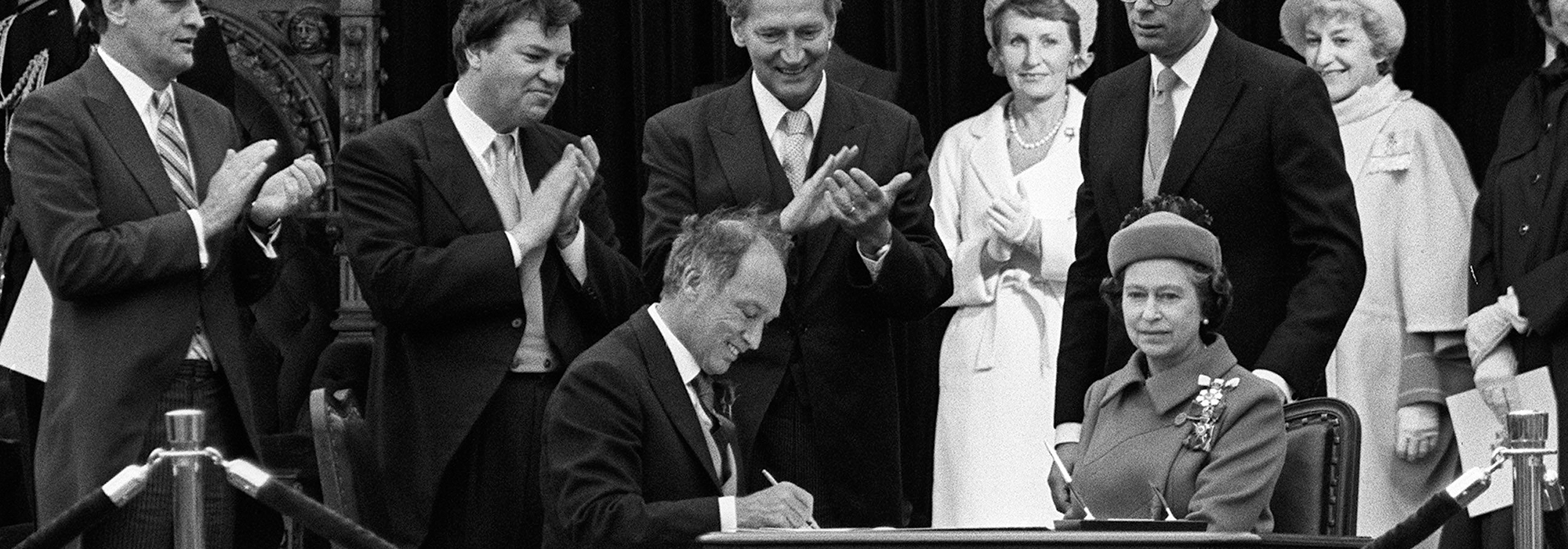
Who could have predicted the significant changes to Canadian society that the Canadian Charter of Rights and Freedoms has brought since it was proclaimed some 35 years ago? This is not a rhetorical question. There were some pretty accurate predictions and some that were way off. Can we predict what the next 25 years under the Charter will bring? Scholars across the country are coming together this week (March 8-10, 2017) at the University of Ottawa to try to do precisely that. We’ll get to them in a moment. But first, let’s go back in time to the heady constitutional years of the early 1980s that preceded the enactment of the Charter.
Those were exciting times. I’m not saying that because I was still young enough to dream of being a major league baseball player and not a law professor. These were times when people were excited about the Constitution. Instead of running away when the media reported on amending the Constitution, citizens banded together and formed constitutional committees to make proposals to parliamentary committees and to government. It was the heyday of citizens’ participation in Canadian parliamentary democracy. It was a great time for women’s groups, Indigenous groups and civil liberties organizations.
Why? Because they forced their way onto the constitutional agenda, they participated and they influenced the process. They did this mostly through the proceedings of the Special Joint Committee on the Constitution, which held public hearings in Ottawa in 1980-81. Reading those transcripts is fascinating (at least for me), because of how right and how wrong some of the predictions were.
There was virtual unanimity among the premiers, federal government officials, committee members and witnesses from civil society that the Charter would involve a massive transfer of power from legislatures to courts. It was acknowledged that the courts would be called upon to adjudicate public policy issues. The debate was about whether this would be a good thing or a bad thing and whether the heretofore conservative courts would be up to the new task of interpreting the constitutionally entrenched Charter of Rights and Freedoms.
Peter Russell of the University of Toronto was one of four hand-picked experts who testified before the parliamentary committee. He was skeptical about the wisdom of turning the keys over to the courts, but when it came to some of his factual predictions, Russell was dead on. He predicted that the courts would be called upon to decide questions relating to religion in schools and Sunday-closing laws. And this is precisely what happened.
Jean Chrétien was the minister of justice and the Charter predictor-in-chief before the committee. He told the committee members that there was no need to add anything to the Charter to preserve Parliament’s ability to legislate regarding capital punishment or abortion, because nothing in the Charter would empower the courts to address these issues. Wrong! On abortion, see R. v. Morgentaler (1988) and on capital punishment see United States v. Burns (2001).
But Chrétien was also prescient. When asked in January 1981 if the open-ended nature of section 15’s equality protection would allow the courts to recognize sexual orientation as an analogous ground, Chrétien did not flinch in responding that indeed the courts would have that power, immediately. And he was right, although it took almost 15 years to get there. The Supreme Court recognized sexual orientation as a protected analogous ground under section 15 of the Charter in Egan v. Canada (1995).
Of course, much more has transpired in the 35 years since the Charter was proclaimed on a rainy Ottawa day. But what will happen in the coming decades? That is what scholars, lawyers, government officials and students are coming together to discuss at the University of Ottawa.
We will almost certainly see environmental issues pressed in the courts. My University of Ottawa colleagues Lynda Collins and Nathalie Chalifour think that the Charter should protect environmental rights. Lakehead University’s Jason MacLean thinks this is the wrong way to go.
Some of the leading scholars and lawyers on fundamental freedoms will debate the future of fundamental freedoms. Jennifer Klinck and Marc-Andre Roy from the wonderfully named firm Power Law raise the question of whatever happened to freedom of peaceful assembly and what should happen to it?
The Ottawa Law Review is sponsoring that panel and another one on the future of Social Policy and the Charter. Experts will consider the future of social and economic rights under the Charter and the possibility of achieving social justice under the Charter. The University of British Columbia’s Margot Young asks poignantly “Does the Charter Have a Soul?” I can’t wait for that.
We will also get a chance to hear the views of Richard Wagner of the Supreme Court of Canada, as well as those of Justice Minister Jody Wilson-Raybould. Lawyers who litigate Charter cases will talk about the challenges they face, and the strategies they think should be employed moving forward. And, of course, there is the media. Three journalists who have covered the courts and the Charter for decades will share their insights and their predictions for the future, including who they think the next chief justice will be.
Not to be missed when we think about the future are two of the biggest public policy issues on the minds of Canadians: health and globalization. On the latter, questions include the application of the Charter to noncitizens, to statelessness and to national security.
We will have to reconvene in 25 years to debrief on how successful these prognosticators turn out to be.
This article is part of the Public Policy toward 2067 special feature.
Photo: Prime Minister Pierre Trudeau signs the proclamation giving Canada independance from Britiain 4/17/1982 as Queen Elizabeth II watches. Back L-R Jean Chretien, Attorney General, Andre Ouellet Registrar General, Gerald Regan Sec of State, Lilly Screyer wife of Gov. Gen. Ed Schreyer, Michael Pitfield Clerk of the Privy Council, and Michael Kirby Asst. sec. to the Cabinet. (CP PHOTO/ Ryan Remiorz)
Do you have something to say about the article you just read? Be part of the Policy Options discussion, and send in your own submission. Here is a link on how to do it. | Souhaitez-vous réagir à cet article ? Joignez-vous aux débats d’Options politiques et soumettez-nous votre texte en suivant ces directives.








